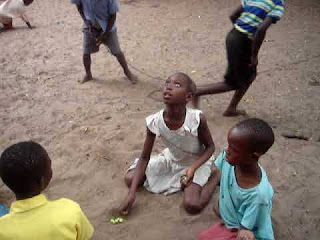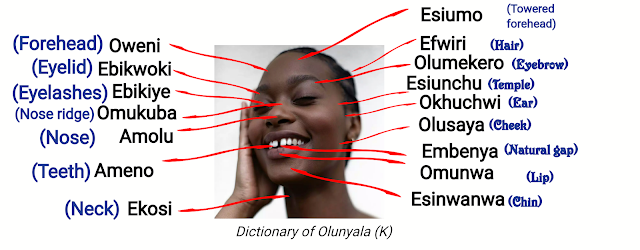ABANYALA BA KAKAMEGA: Words to Express Politeness in Olunyala (K).
Abanyala ba kakamega speak with a lot of etiquette in their verbal interactions. The main way being addition of the ~kho Politeness Marker Suffix (PMS) on verbs. The following are the main ways used to signal politeness.
- Ab'oluyali- used as word of respect when addressing honourable person(s).
- Abakeni ab'oluyali, milembe.
- Omukeni ow'oluyali Yosefu Wawire, mulembe.
- Ab'owaali- Used as a word of respect to address guests and hosts on high table or those on the alter during a function.
- Abakeni ab'owaali, mulembe.
- Omukeni owokhuwaali, mulembe.
- Asanti- thank you. Borrowed from Kiswahili which means the same as ochio.
- Ekhupa asanti khu kuka Nyota.
- Asanti okhumberesa omukherekha.
- ~ateeka- thank you that is laced with some meaning shade of congratulations.
- Bateeka okhubicha ekera.
- Wateeka okhuchukeniya.
- Mwateeka okhuchulechera embusi.
- Wakiteeka yaya. Congratulations my step-brother for the job you are doing.
- Atiti- welcome. Used as an answer after being told thank you. At times the phrase wesi ochio is used.
- Mama: Ochio khusiokhulia. Thank you for the food
- Baba: Atiti mama. Welcome, mother.
- B'antu- 'Excuse me' that is laced with some meaning shade of hate or dissatisfaction.
- B'antu, chulayo embiche.
- B'antu, njusekho oluhere?
- Basye- Means please that is laced with some meaning shade of hate or dissatisfaction.
- Basye, ndekhe embe. Leave me alone please
- Basye, wunangira sina? Please,why are you calling me
- Baye- Please that is laced with some hate or dissatisfaction. Alternative to basye.
- Baye, ndekhe embe. Leave me alone please
- Baye, wunangira sina? Please,why are you calling me?
- ~beere- forgive; pardon me
- Mbeere okhucheba, niwe owibire amatumwa? Pardon me for asking, are you the one who stole maize?
- Hera- hello. Commonly used when you want to give a warning.
- Hera, okenda makesi. Hello, walk around cautiously.
- Hera, olinda omunwa; ochalinda elisi.
- ~hoti- excuse me I enter a room. Used in a home setting and not schools and offices toask for permission to enter.
- Hoti munyumba muno.
- Kalaha- sorry. Used when addressing second or third person.
- Kuka, kalaha khukakhukhwiyekho. Grandfather, sorry for what has befallen you.
- ~kho suffix- the use of this politenes marker suffix (PMS) ~kho on verbs is the main way to express politeness when using verbs. The politeness marker suffix can also be doubled to increase the degree of politeness.
- Yeya muweru (Impolite request/order)
- Yeyakho muweru. (politer request)
- Yeyakhokho muweru. (politest request)
- ~khomo, ~khoyo, ~khoho, ~khokho- place marker suffixes ~mo, ~yo, ~ho and ~kho can be added to verbs with the PMS ~kho to mark politeness in a request.
- Omuliro kuchiima, mbanirekhomo. The fire is getting off, please ignite it for me.
- Njirekhoyo, ese endirikhirwe. Please go thereon mybehalf, I am held up.
- Njeyerekhoho nase ni'fuka. Please, sweep for me here as I cook.
- Njerekhokho chumbe. Please, putsome salt on top of it for me.
- ~kongoyera- pleading
- Ekhwekongoyera, mbekho owusie. Plead with you, helps me some flour.
- Mbeere- forgive me.
- Mbeere, nise oliye omukhenye.
- Mbeere embolekhomo- Pardon me; forgive me for what I want to say. Used to interrupt politely or to ask a speaker to repeat.
- Mberevembolekhomo, kolekho si owooye.
- Mbolakho wusa- I say without offence.
- Mbolakho wusa, ewe oli omwibi. I say without offence, you are a thief.
- Mwikhae- sorry for coming in when you are already seated. Used when addressing a group of people you find seated.
- Mwikhae bakoki.
- N'eria- with due respect respect and honour
- Ne'eria, ekhusaba wumbekho eng'ombe. With due respect, I request you give me a cow.
- N'esiebeera- with feelings of sorrow, empathy and sympathy. pect title for the living dead.
- N'esibeera, ekhuwaala efwa lia Nyongesa.
- N'oluyali- with respect, gratitude and honour
- No'luyali, ekhusaba wumbekho eng'ombe. With a lot of gratitude, I request you give me a cow.
- Ochio- Thanks; precisely.
- Ochio, kuka. Thanks grandfather.
- Ochio okhwicha. Thanks for coming.
- Ochio muno- thank you very much.
- Ochio muno okhwicha. Thank you very much for coming.
- Omukhaye- this title of honour which is used for a lady of approved social status to. mark respect.
- Omukhaye Lena Kulundu kekhaye mu'nyumba.
- Omukhulunchu- it is a respect laced title used for a man who is a elder in society.
- Omukhulunchu Sikanga Waudo, mulembe.
- Omukoosi- this is a respect laced title of honour for a royal person: Excellency, his Lordship, sir.
- Omukoosi Wamwalwa Kijana, mulembe.
- Omukuka- respect title for the male living dead.
- Omukuka Mukwe Maloba kali omukhebi.
- Omukukhu- respect title for the female living dead.
- Omukuka Mukwe Maloba kali omukhebi.
- Omwami- this is a respect laced title of honour for a man of approved social status: honourable, rich, elder, hisband, boss, elected leader, sir.
- Omwani Wangwe, mulembe.
- ~onekhana- it seems. Used to introduce one's opinion in a polite manner.
- Kaonekhana, oli omwimani.
- Bionekhana, olabekho omubi.
- Owase- Excuse me. Used by people who are of same status to address each other.
- Owase, mbekho enyama. Excuse me, give me some meat.
- Owase ewe, owaho. Excuse me, are you going home.
- Pole- sorry. Borrowed from Kiswahili to mean the same as kalaha.
- Pole okhukosia omukhaye. Sorry for the deathof your wife.
- Pole mwanewe, ekhusenirekho. Sorry child for stepping on you..
- ~saba omunwa- I/we apologise. Used to ask leave of absence or to be allowed to talk when another person was talking.
- Esaba omunwa, endi okhucherewakho. I ask for apology for I will be late.
- ~amusangalira Used when you welcome visitors into a home to show happiness for their arrival.
- Namusangalira abakeni, yingire mu'nyumba. I happily welcome you visitors, enter the house.
- Khwamusangalira abakeni, yongire mu'nyumba.We happily welcome you visitors, enter the house.
- ~siima- please. Used when you want to place a request.
- Ni osiima, khuchie engo. Please, let us go home.
- Mwakhasiima, namukanirakho olukano lwange? Would you like me to tell you my tale?
- Ni musiima, chukabekho eswa.
- Weebale- thanks.
- Webale baba.
- Webale okhumba omunyu.
- Yeee- a polite way of responding to a call. Done with a rising intonation. It is followed by the relation title of the caler.
- Yee mama, nise ono ano.
- Yee kukhu.




Comments
Post a Comment